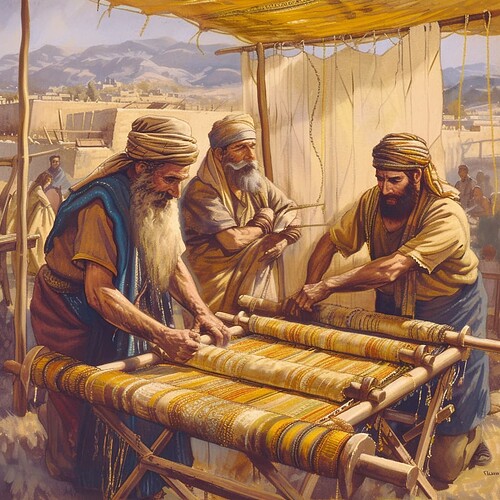 February 22: Exodus 35 - God’s dwelling among people
February 22: Exodus 35 - God’s dwelling among people
 Introduction
Introduction
Exodus 35 is a command-post from God through Moses, detailing the initiation for the construction of the Tabernacle - a mobile sanctuary for God’s divine presence. Everyone who is “stirred and willing” is prompted to partake in the creation of this sanctuary.
 The Gathering of Resources and Skill
The Gathering of Resources and Skill
![]() Key Verse: Exodus 35:5 “Take from among you a contribution to the LORD. Whoever is of a generous heart, let him bring the LORD’s contribution: gold, silver, and bronze."
Key Verse: Exodus 35:5 “Take from among you a contribution to the LORD. Whoever is of a generous heart, let him bring the LORD’s contribution: gold, silver, and bronze."
Through the offering of heart-felt contributions of skills and resources, we are revealed a sense of the communal effort in the creation of the Tabernacle, an important aspect in fostering a mutual sense of sacred responsibility.
 The Sabbath Rule
The Sabbath Rule
![]() Key Verse: Exodus 35:2 “Six days shall work be done, but on the seventh day you shall have a Sabbath of solemn rest, holy to the LORD.”
Key Verse: Exodus 35:2 “Six days shall work be done, but on the seventh day you shall have a Sabbath of solemn rest, holy to the LORD.”
Here God reemphasizes the vital importance of honoring the Sabbath, a key pillar of devotion and fundamental practice, which remains untouched, even in the face of the massive project at hand.
 Key Themes and Reflections
Key Themes and Reflections
God’s dwelling place amongst us and communal effort are two of the central themes of Exodus 35. God institutes the Tabernacle as a physical representation of His presence amongst the Israelites. Meanwhile, the gathering of the community to willingly contribute serves to emphasize the importance of communal effort and unity.
 Today’s Application
Today’s Application
Exodus 35 serves as a challenge for us to examine our hearts. Are we stirred and willing, ready to use our contributions, be it possessions or skills, for God’s glory? It is also a reminder of the significance of Sabbath rest, even as we engage in acts of service.
 Hidden Gem
Hidden Gem
Bezalel and Oholiab are detailed as key artisans in the creation of the Tabernacle. This is potentially one of the earliest instances in Scripture mentioning artists and craftspeople toiling for God’s glory!
 Reflective Q&A
Reflective Q&A
![]() What does the Tabernacle symbolize in our faith today?
What does the Tabernacle symbolize in our faith today?
A: The Tabernacle is symbolic of God making a dwelling among His people. Today, it serves as a metaphor for God’s presence in our hearts and lives.
![]() Why is the community’s involvement significant in the construction of the Tabernacle?
Why is the community’s involvement significant in the construction of the Tabernacle?
A: The community’s collective effort in building the Tabernacle highlights the role of the community in shared faith and devotion. It is an early representation of the Church – God’s collective, active body.
![]() What lessons can we draw from the reiteration of the Sabbath commandment?
What lessons can we draw from the reiteration of the Sabbath commandment?
A: The reiteration signifies the importance of Sabbath, reminding us that, even in the earnestness of doing God’s work, there remains sacred necessity for rest and reverence.
 Join the Discussion
Join the Discussion
Let’s share our thoughts - How is God stirring your heart towards contributory service? What do we perceive as our Tabernacle – our communal effort for God’s presence?
 See You Tomorrow in Exodus 36:
See You Tomorrow in Exodus 36:
Get ready to delve deeper into the elements of the Tabernacle and what they symbolize in our journey with God. Get your tools ready, the construction is about to begin!
